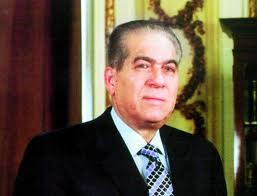 Egypt’s new interim prime minister broke into tears in front of journalists on Sunday as he spoke about the state of the country’s economy, saying it was “worse than anyone imagines.”
Egypt’s new interim prime minister broke into tears in front of journalists on Sunday as he spoke about the state of the country’s economy, saying it was “worse than anyone imagines.”
Egypt’s transition in the months since Hosni Mubarak’s ouster has been rocky, with protests against the military council leading the process, an increase in crime and the battering of the tourism industry that was once a pillar of the economy.
Kamal el-Ganzouri, the third temporary prime minister since Mubarak’s ouster in February, said his priorities were the restoration of security and economic progress.
At one point in his news conference, el-Ganzouri became teary eyed as he recalled seeing “an Egyptian man on TV saying I want security, not bread.”
He said austerity measures were needed to start reducing the deficit but that no new taxes will be imposed. He did not elaborate on exact steps.
El-Ganzouri said his government will not consider loans from the International Monetary Fund until the outlook of the Egyptian budget becomes clear. In the summer, the IMF offered a $3 billion loan, but Egyptian officials turned it down.
The IMF is projecting Egypt’s economic growth to be just 1.2 per cent this year, compared with about 5 per cent in 2010.
“Solidarity is needed to face the economic crisis and security problem for citizens to be pleased with the revolution,” he said.
Urban consumer inflation in Egypt rose to an annual 9.1 per cent in November from 7.1 per cent in October. The unemployment rate in the third quarter climbed to 12 per cent from just under 9 per cent a year earlier. Net international reserves dropped by roughly 40 per cent by the end of October, compared with the end of 2010.
The military council, which stepped in to rule when Mubarak was pushed out, appointed el-Ganzouri and his government at the end of November after a violent crackdown on protesters demanding an end to military rule.
In response to the protests, the previous prime minister, Essam Sharaf, resigned and the head of the military council pledged to transfer power to a civilian administration by July 2012. The council also transferred wide powers to el-Ganzouri’s government in an attempt to show it had independence and that the military council would leave power — though gradually.
El-Ganzouri blamed the last decade of Mubarak’s 30-year rule and the corruption that took place then for the ballooning deficit.
El-Ganzouri is himself a Mubarak-era prime minister who served from 1996 to 1999 but he has not been tainted by corruption.
Still, protesters who dislike him for his part in the old regime have been camped in front of el-Ganzouri’s office in downtown Cairo, forcing him to hold meetings at the Ministry of Planning in a Cairo suburb.

Leave a Reply
You must be logged in to post a comment.